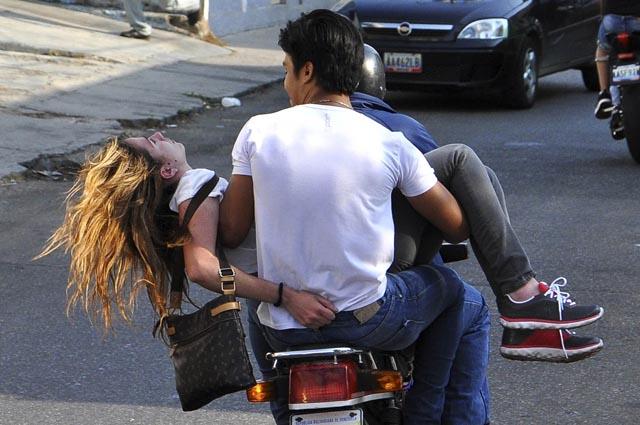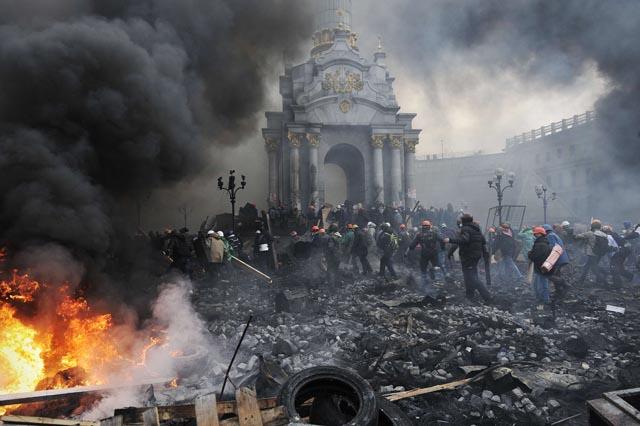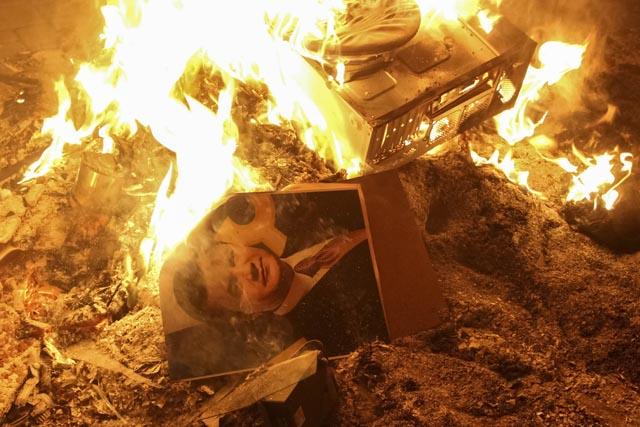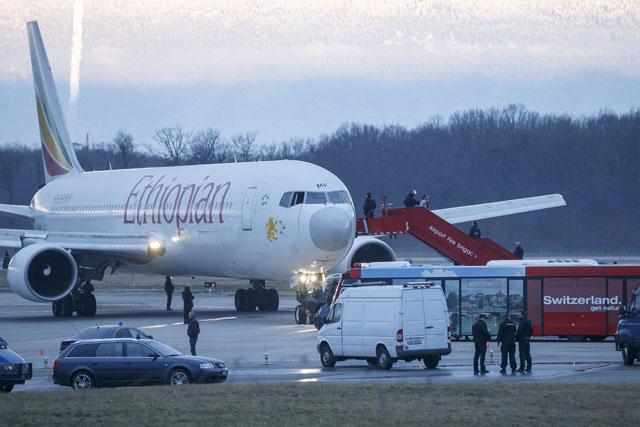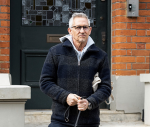KIEV — Western powers threatened sanctions on Wednesday over the death of 26 people in the worst violence since Ukraine’s independence from the Soviet Union, pressuring President Viktor Yanukovich to compromise with his pro-European opponents.
Yanukovitch, backed by Russia, denounced the overnight bloodshed in central Kiev as an attempted coup and his security service said it had launched a nationwide “anti-terrorist operation” after arms and ammunition dumps were looted.
In the western bastion of Ukrainian nationalism, a regional assembly declared self-rule and crowds seized public buildings.
European Union leaders condemned what they called “the unjustified use of excessive force by the Ukrainian authorities” and said they were urgently preparing targeted sanctions against officials responsible for the crackdown.
EU officials said Yanukovich himself would not be on the list to keep channels of dialogue open. The foreign ministers of Germany, France and Poland will visit him on Thursday, hours before an emergency EU meeting to decide on the sanctions.
The United States, going head to head with Russia in a dispute heavy with echoes of the Cold War, urged Yanukovich to pull back riot police, call a truce and talk to the opposition.
Neighbouring Poland’s prime minister, Donald Tusk, said Ukraine faced civil war, even partition, if dialogue fails: “What if no compromise is achieved?” he asked in parliament. “We will have anarchy and perhaps division of the state or civil war, the beginning of which we may now be witnessing.”
Protesters have been occupying central Kiev for almost three months since Yanukovich spurned a far-reaching trade deal with the EU and accepted a $15-billion Russian bailout instead.
The sprawling nation of 46 million, with an ailing economy and endemic corruption, is the object of a tug-of-war at a global level between Moscow and the West. But the struggle was played out at close quarters, hand to hand, in fighting through the night on Kiev’s Independence Square, or Maidan.
After night fell, fires blazed along the barricaded frontline between the protesters and riot police but there was no immediate sign of a repetition of Tuesday’s violence.
Russian President Vladimir Putin and Yanukovich spoke by telephone during the night, and both denounced the events as an coup attempt, a Kremlin spokesman said.
Russian Foreign Minister Sergei Lavrov blamed the West for encouraging opposition radicals “to act outside of the law”.
Moscow announced on Monday it would resume stalled aid to Kiev, pledging $2 billion hours before the crackdown began. The money has not yet arrived and a Ukrainian government source said it had been delayed till Friday “for technical reasons”.
Ukraine’s hryvnia currency, flirting with its lowest levels since the global crash five years ago, weakened to more than nine to the dollar for the second time this month.
Battle zone
After a night of petrol bombs and gunfire on Independence Square, a trade union building that protest organisers had used as headquarters stood blackened and gutted by fire.
Security forces occupied about a third of the square — the part which lies closest to government offices and parliament — while protesters reinforced their defences on the remainder of a plaza they have dubbed “Euro-Maidan”.
In a statement posted online in the early hours, Yanukovich said he had refrained from using force during three months of unrest but was being pressed by “advisers” to take a harder line: “Without any mandate from the people, illegally and in breach of the constitution of Ukraine, these politicians — if I may use that term — have resorted to pogroms, arson and murder to try to seize power,” the president said.
He declared Thursday a day of mourning for the dead. The state security service said it had opened an investigation into illegal attempts by “individual politicians” to seize power.
One opposition leader, former world champion boxer Vitaly Klitschko, walked out of a overnight meeting with Yanukovich, saying he could not negotiate while blood was being spilt.
When fighting subsided at dawn, the square resembled a battle-zone, the ground charred by Molotov cocktails. Helmeted young activists used pickaxes and elderly women their bare hands, to dig up paving to stock as ammunition.
The Health Ministry said 26 people were killed in fighting in the capital, of whom 10 were police officers. A ministry official said 263 protesters were being treated for injuries and 342 police officers, mainly with gunshot wounds.
The interior ministry said five of the dead policemen were hit by identical sniper fire in the head or neck. Journalists saw some hardline protesters carrying guns at the barricades.
EU weighs sanctions
European Council President Herman Van Rompuy said the 28-nation EU, at an emergency meeting on Thursday, would impose asset freezes and visa bans on those blamed for the bloodshed.
US Secretary of State John Kerry, on a visit to Paris, said Washington was ready to impose similar sanctions.
The European Investment Bank, the EU’s soft-loan arm, said it had frozen its activities in Ukraine due to the violence.
The leaders of Germany and France said after talks in Paris that the sanctions were only part of an approach to promote a compromise leading to constitutional reform and elections.
“What is happening in Ukraine is unspeakable, unacceptable, intolerable,” French President Francois Hollande told a joint news conference. German Chancellor Angela Merkel said targeted sanctions against Ukraine’s leaders would show the EU was serious in pressing for a political solution. She made clear they were talking to all sides in the crisis, including Russia.
Diplomats cautioned that any sanctions would be largely symbolic, noting that similar Western measures had long failed to sway or unseat the rulers of Belarus or Zimbabwe.
In staunchly pro-European western Ukraine, opponents of Yanukovich declared political autonomy after seizing regional administrative buildings in Lviv overnight and forcing police to surrender. Protesters also took over regional offices in Ivano-Frankivsk, blocked a road to a border crossing to Poland and torched the main police station in the city of Ternopil.
Many in the west, parts of which were first ruled from Moscow in World War Two, view Yanukovich as a corrupt ally of Russia and of business oligarchs in the Russian-speaking east.
On the central Kiev square, opposition speakers harangued thousands of protesters, some masked and in combat fatigues.
Priests intoned prayers from a stage while young protesters in hard-hats improvised forearm and knee pads to protect themselves against baton blows. Others prepared petrol bombs.
“They can come in their thousands but we will not give in. We simply don’t have anywhere to go. We will stay until victory and will hold the Maidan until the end,” said a 44-year-old from Ternopil who gave only his first name of Volodymyr.
Traffic entering Kiev were restricted and the capital’s metro was closed to prevent protesters getting reinforcements.
Demonstrations erupted in November after Yanukovich bowed to Russian pressure and pulled out of a planned far-reaching association agreement with Brussels. Western powers urged him to turn back to the EU and the prospect of an IMF-supported economic recovery, while Russia accused them of meddling.
Ukraine has been rocked periodically by political turmoil since independence from the Soviet Union more than 22 years ago, but it has never experienced violence on this scale.

